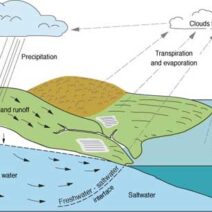In the swirling vortex of contemporary discourse, few subjects elicit stronger emotions than climate change. The battle between scientific consensus and skepticism resembles a tempest at sea, where the crew of empirical truth faces off against the gales of doubt. As society grapples with this critical issue, it becomes increasingly imperative to discern whether we can indeed slow down the tide of climate change — an endeavor that calls for a multifaceted exploration of scientific realities juxtaposed with prevailing skepticism.
To commence, it is crucial to establish what is meant by climate change. The Earth’s climate is a complex system, governed by myriad factors, including atmospheric composition, greenhouse gas emissions, and solar radiation. The consensus among climate scientists is unequivocal: human activities are substantially influencing this system, driving an acceleration in global temperatures that poses a grave threat to ecosystems, weather patterns, and human livelihoods. Scientific models, akin to navigational charts, predict that if current trajectories remain unchecked, we may well face catastrophic impacts by the end of the century.
Yet, like shadows at dusk, skepticism looms large. There exists a considerable faction, often characterized as climate skeptics, who challenge the prevailing narratives. They argue that climate change models are flawed, and they delve into the realm of natural variability, proposing that historical climate fluctuations could just as easily explain present-day warming trends. This skepticism, while grounded in a desire for thorough investigation, can obfuscate the pressing need for action. Critics often dismiss the warnings of climate scientists as alarmist rhetoric, favoring economic growth and industrial prosperity over environmental stewardship.
The metaphorical landscape of climate skepticism can be alluring, akin to a siren’s song that lulls society into complacency. It resonates with a desire for simplicity in a world rife with complexity. However, to rely solely on these seductive arguments is to navigate without a compass amidst turbulent waters. The evidence supporting anthropogenic climate change is as robust as the hull of a ship built to weather storms. The Intergovernmental Panel on Climate Change (IPCC) reports are replete with data from diverse fields — oceanography, meteorology, and geology — converging on a singular conclusion.
Combatting this skepticism demands not only an arsenal of data but an exposition of the implications of inaction. In this narrative, the metaphor of a ticking clock becomes salient. Each tick signifies the passage of time toward irrevocable changes in our planet’s climate. Continuing the metaphor, the question emerges: Can we reset the clock, or are we merely prolonging the inevitable? Scientific evidence cautions against complacency, revealing that time is of the essence. Gathering more data while delaying action compounds the risks faced by future generations. As the hands of the clock advance, the severity of climate impacts only escalates.
Recognizing the dire stakes at play compels a thorough examination of viable pathways toward remediation. Engaging with the intricate tapestry of solutions, one notes that these strategies do not merely advocate for a reactive stance but rather call for proactive measures. Transitioning to renewable energy sources, such as solar, wind, and hydroelectric power, emerges as a critical vector for mitigating greenhouse gas emissions. This transformation resembles the gradual dawning of a new era, a clarion call to embrace sustainable technologies that fortify our defenses against the encroaching climate crisis.
Education plays an equally transformative role in this endeavor. Empowering individuals through scientifically accurate information fosters a culture of environmental literacy. A populace informed by facts is less susceptible to the tendrils of misinformation propagated by skeptics. Education acts as a lighthouse, illuminating the perilous waters where doubt and uncertainty may otherwise wreak havoc. Initiatives that promote climate science in schools and community forums are paramount; after all, knowledge is an antidote to skepticism.
In examining the polarization surrounding climate action, it becomes clear that emotional narratives often overshadow empirical data. Dialogues framed solely as confrontations between scientists and skeptics obscure the nuances of the discussion. Bridging this chasm requires empathetic engagement, recognizing the legitimate concerns that skeptics may possess regarding economic sacrifice and potential lifestyle changes. Acknowledging these fears while simultaneously elucidating the long-term benefits of climate action can foster a collaborative approach rather than an adversarial one.
The potential for innovation also cannot be overlooked. The burgeoning sector of green technology presents palpable opportunities to stimulate the economy while addressing environmental degradation. From electric vehicles to carbon capture technologies, forward-thinking solutions appeal to both environmentalists and skeptics alike. These innovations are akin to planting seeds for future growth; nurturing this nascent industry could yield not only environmental benefits but also enhance job creation and energy independence.
Ultimately, the crescendo of climate action must reverberate through all facets of society, imploring individuals, businesses, and governments to participate in this collective journey. The path forward demands resilience—the ability to adapt to changing circumstances while steadfastly pursuing the reduction of greenhouse gas emissions. It evokes the analogy of a ship navigating through turbulent seas: though the journey may be fraught with challenges, the destination—a sustainable, thriving planet—is worth the effort.
In summary, the question of whether we can truly slow down climate change rests upon the interplay between scientific evidence and societal skepticism. While skeptics present challenges that must be navigated with compassion and understanding, the overwhelming consensus among scientists urges immediate action. We have the means to embark on a transformative journey, embracing renewable energy, education, and innovation as our guiding stars. As we steer through these tumultuous waters, our commitment to reversing climate change must course-correct our trajectory, ensuring that we leave a resilient planet for generations yet to come.


